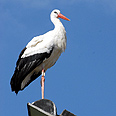
Migration watch saves Israeli jets from bird strike
Volunteer bird experts team up with IDF to prevent bird strikes on jets in Israeli skies, one of busiest bird migration routes on globe
"Every instrument that could give bad news did: Cracking metal, all alarms ringing," former Israel Air Force pilot Israel Baharav said.
"I didn't need instruments to tell me the engine was gone and I was now sitting in a piece of scrap metal that had been a brand new fighter plane just seconds before."
Baharav ejected and survived to learn that what he had experienced was a devastating bird strike, a hazard for military and civilian air traffic that destroys planes and kills pilots across the skies, but most particularly in the sky over Israel.
The Jewish state combines one of the world's biggest air forces, busy commercial aviation traffic, a tiny air space and a surprising discovery about the natural world.
What nobody knew on that warm and clear February day in 1973 when Baharav took off to lead a training flight was that Israel, due to its location at the junction of Europe, Africa and Asia, is one of the busiest bird migration routes on the globe.
From 1990 to 2000 130 fighter aircraft from the air forces of 10 countries alone crashed and 41 pilots were killed due to collisions with birds, according to International Bird Strike Committee, an expert group on military and civil flight safety.
500 million birds cross Israel annualy
But the high incidence of bird strike risk over Israel was only unveiled after the IAF began working with ornithologists to understand why incidents like the one Baharav experienced happened so often.
"When we started cooperation with the ornithologists we knew very little. We were aware of birds out there but the scale was completely unknown," said Asaf Agmon, head of the IAF's Fisher Institute for flight security.
Researchers discovered that no less than an estimated 500 million birds cross the tiny country twice a year, once on their way to wintering grounds mostly in Africa from breeding grounds in Europe and Russia and then back the other way in spring.
"Of some bird species, like the globally endangered Lesser Spotted Eagle, virtually every bird that exists of this species is a visitor to Israel twice a year," said Professor Yossi Leshem of Tel Aviv University's Deptartment of Zoology. "And yes, I do mean the entire world population."
Paradise for bird-lovers, perilous for pilots
Large birds in flocks are especially dangerous for aviation. About 80 percent of all White Storks in the world pass over Israel. The heavy birds can have an impact equivalent of more than 40 tons in a collision depending on the speed of the jet.
According to data published earlier this week 800,000 storks flew over Israel between August and the end of September.
In order to cope with this traffic jam in the skies over the holy land, in recent years a complex flight information system for all big birds has been designed to avoid collisions. "Take care. We share the air," is the motto of present-day IDF courses on nature protection.
During the entire migration period from August to October a network of ground observers – volunteer ornithologists with binoculars and telescopes – is deployed every 2.5 km (1.553 miles) across the entire width of the country. They count the birds flying over, log species, altitude and direction, and alert the authorities of big concentrations.
These volunteer "flight-controllers" are supported by counts from glider planes. Leshem, who has helped initiate the joint research, said he has even used an Israeli military drone for the first time to research bird migration.
Together with the results of radar and satellite tracking of several bird species, an exact and up-to-the-minute information network can be established. "Now we have exact maps and act accordingly," Agmon said.
- Follow Ynetnews on Facebook










